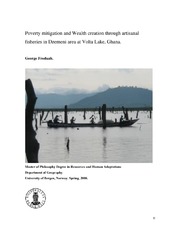Poverty mitigation and Wealth creation through artisanal fisheries in Dzemeni area at Volta Lake, Ghana.
Master thesis
Permanent lenke
https://hdl.handle.net/1956/3051Utgivelsesdato
2008Metadata
Vis full innførselSamlinger
- Department of Geography [627]
Sammendrag
The study focused on the role of fisheries in wealth creation and poverty mitigation in theDzemeni area, at the Volta Lake of Ghana. Three wealth groups were identified based on theirvalue of asset possession, income earnings and productive capacities at the household level. Themajor source of livelihood is fisheries (involving fishing, fish mongering or fish trade in the localmarket). Other livelihoods are farming, making of fishing gears like canoes, basket and net traps,bamboo traps and ovens, repairing of damaged outboard motors; selling of other items like bagsof charcoal, pepper, livestock; shop keeping; corn mill services and transport services.Investments in securing more assets, timely disposal of assets, increasing of household size wereamong the livelihood strategies employed by the rich to accumulate wealth. The poorrespondents are more vulnerable to the effects of the seasonal fluctuations in fish catches thanthe rich respondents because they depend more on fishing as their livelihoods. Death of aprominent family member or the breadwinner of the family is among the factors that makemembers of the low strata poorer and more vulnerable. It was also discovered that children frompoor households in the study area are more disadvantaged and vulnerable than other categories ofpeople as they are mostly over exploited by the rich who foster them. This is due to their parent’sinability to cater for them or secure a better future for them. The victims are mostly young boysand girls aged between 5 and 14 years.
Utgiver
The University of BergenOpphavsrett
The authorCopyright the author. All rights reserved
